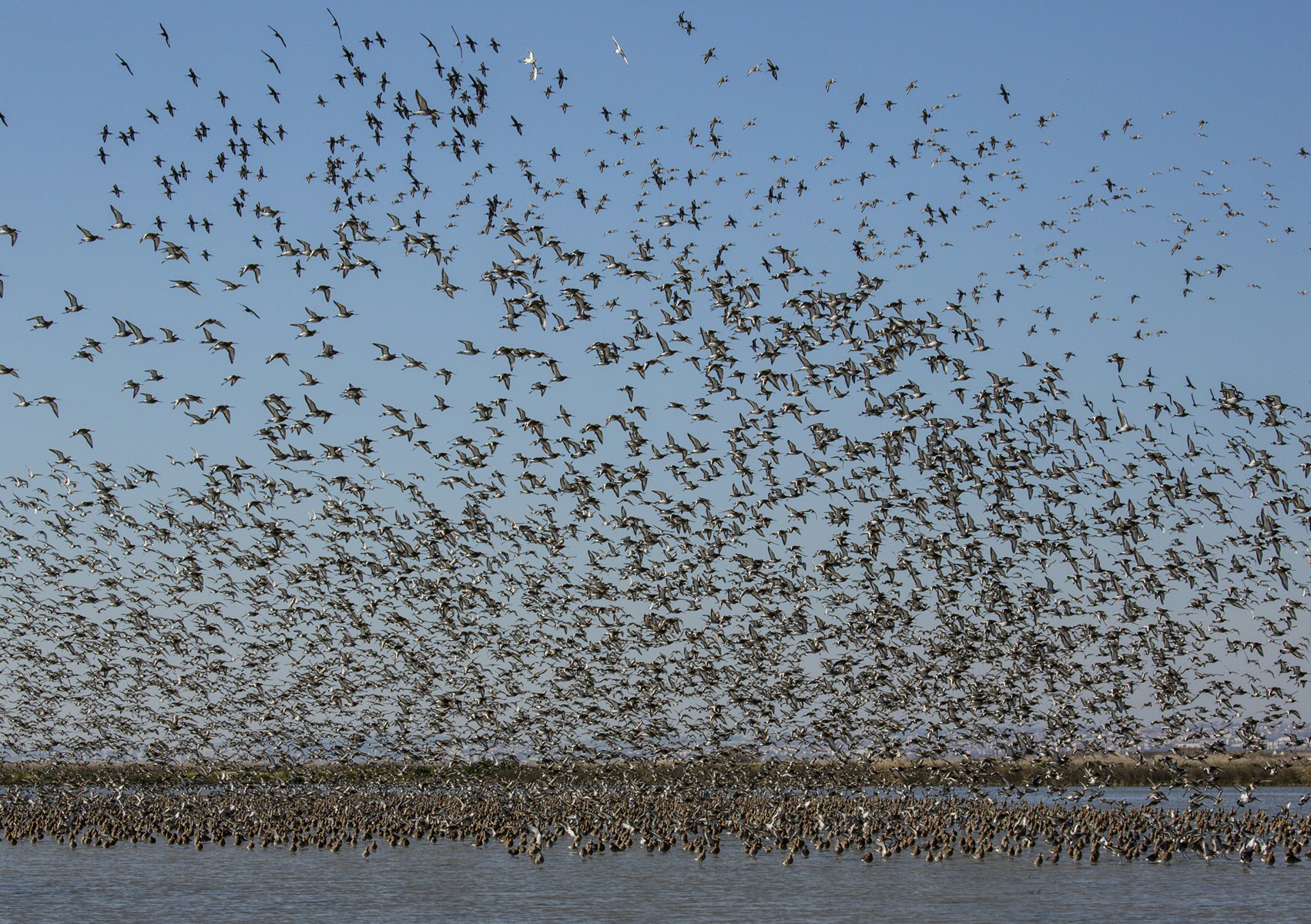Young black-tailed godwits prefer Portuguese staging sites to Spanish ones
Why has the number of black-tailed godwits resting in Spain during spring migration been falling in recent years and the number resting in Portugal been increasing? Mo Verhoeven from the University of Groningen and colleagues have discovered that young black-tailed godwits are effecting this change in migratory pattern. Almost all adult birds stick to their regular route as they migrate to the Netherlands: either along the Portuguese coast or via inland Spain. The research is published today in Biology Letters.
In the years round 2007 about 24,000 black-tailed godwits (Limosa limosa) were counted in Extremadura in Spain during spring migration and more than 44,000 in the Tagus and Sado Estuaries in Portugal. In the period 2013-2017 researchers from the University of Groningen counted only about 10,400 in Extremadura and as many as about 51,400 in the two Portuguese sites. The birds use the areas as a stopover on their spring migration from West Africa or Southern Spain to northern nesting areas.

Young bring about change
It is known that species change their migratory behaviour in response to changes in their environment. The question that follows is which biological processes make this behavioural change possible. Mo Verhoeven and his colleagues have shown that with the spring migration route of the black-tailed godwit it is the younger generation that is shifting to Portugal. The plasticity in the young birds’ development appears to make this possible.
Conservative adults
Genetic change or flexibility in an individual’s possibilities can also cause changes in appearance or behaviour within a population, but neither seemed to fit here. In the five-year period measured (a year longer than the average lifespan of a black-tailed godwit) the adults proved to be conservative: year in year out they were seen in their regular staging sites. The shift in behaviour thus revealed a generation gap: the young black-tailed godwit didn’t follow in the footsteps of their parents.
Rice fields
Why the ‘Portuguese route’ along the Atlantic coast continues to gain in popularity at the expense of the ‘Mediterranean Sea route’ over inland Spain is unclear. It could be due to changes in wind direction or the expansion of the rice fields by the Tagus Estuary.
More information
- Generational shift in spring staging site use by a long-distance migratory bird
Mo A. Verhoeven1, A. H. Jelle Loonstra1, Jos C. E. W. Hooijmeijer1, Jose A. Masero2, Theunis Piersma1,3 and Nathan R. Senner1
1Conservation Ecology Group, Groningen Institute for Evolutionary Life Sciences, University of Groningen, 2Conservation Biology Research Group, Department of Anatomy, Cell Biology and Zoology, Faculty of Sciences, University of Extremadura, Avenida de Elvas, Spain, 3NIOZ Royal Netherlands Institute for Sea Research, Department of Coastal Systems and Utrecht University, PO Box 59, 1790 AB Den Burg, Texel, The Netherlands
Publication in Biology Letters, 14 February 2018; DOI http://dx.doi.org/10.1098/rsbl.2017.0663
- Contact: Mo Verhoeven , or Theunis Piersma , theunis.piersma nioz.nl
- Photo: A flock of black-tailed godwits (Limosa limosa) spiral into a rice field outside Lisbon, Portugal. The rice fields of the Tagus Estuary hold more than fifty thousand godwits during northward migration every year. Photo credit: Jan van de Kam
| Last modified: | 26 October 2021 1.21 p.m. |
More news
-
03 April 2025
IMChip and MimeCure in top 10 of the national Academic Startup Competition
Prof. Tamalika Banerjee’s startup IMChip and Prof. Erik Frijlink and Dr. Luke van der Koog’s startup MimeCure have made it into the top 10 of the national Academic Startup Competition.
-
01 April 2025
NSC’s electoral reform plan may have unwanted consequences
The new voting system, proposed by minister Uitermark, could jeopardize the fundamental principle of proportional representation, says Davide Grossi, Professor of Collective Decision Making and Computation at the University of Groningen
-
01 April 2025
'Diversity leads to better science'
In addition to her biological research on ageing, Hannah Dugdale also studies disparities relating to diversity in science. Thanks to the latter, she is one of the two 2024 laureates of the Athena Award, an NWO prize for successful and inspiring...
